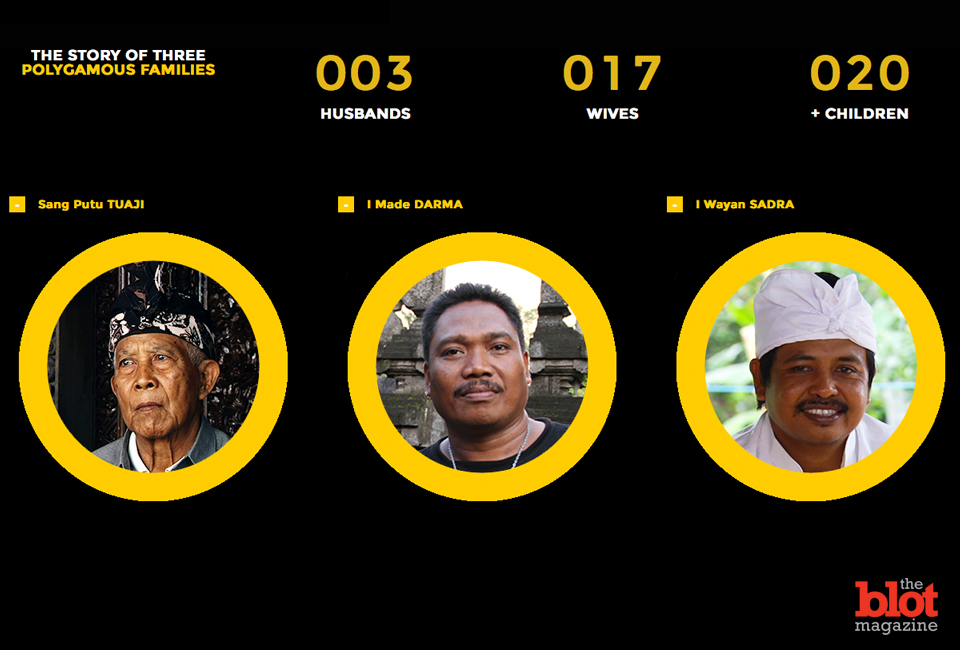
When I think of Bali, Indonesia, I think of my friend’s tropical paradise honeymoon photos, so I was stunned by the documentary “Bitter Honey.” It is about three polygamist families made up of three husbands, 17 wives and 20 children and shows what goes on underneath Bali’s touristy image.
The Balinese co-wives have no rights and no voice. They are psychologically manipulated, humiliated and physically abused by their husbands. Why do they stay? Most feel trapped financially with no means to care for their children. In addition to cultural stigma and fear of leaving, years of abuse have eroded their self-esteem.
The film’s director, Robert Lemelson, has an M.A. and doctoral degree and works at UCLA as an anthropologist. He has spent 20 years making documentary films in Indonesia with a focus on culture and mental illness and the relationship between culture and disorders like gender violence, PTSD and schizophrenia.
Thank goodness for people like him — agents of change that shine the light on social problems. TheBlot Magazine caught up with Lemelson at this year’s Clinton Global Initiative, which was held last month in New York.

Dorri Olds: What brings you here to the Clinton Global Initiative?
Robert Lemelson: I’ve attended CGI for the last five years. President Clinton brings together philanthropists, scholars, activists, business people, government people, even heads of state, and together they try to solve problems. They’ve solved many problems over the years and raised nearly $100 billion through philanthropic efforts for healthcare, the environment and education.
The big focus this year is on women’s empowerment and reducing violence. CGI is not generally a venue for filmmakers, but because the film I directed and produced was related to their topic this year, I [screened] parts of “Bitter Honey” and [discussed] it.
Before seeing your movie, I had no idea how bad it was for women in Bali.
Bali is not typically associated with these women’s issues. Bali is best known for premier cultural tourism, which the Balinese have cleverly marketed, particularly in the past 20 years. It has become a tradition to go see Bali’s beauty and rich culture of music and dance. Bali does have all these things, but like any other society, Bali has problems.
From 2000 to the present, I shot about 10,000 hours of footage and made a dozen films on a range of social issues of significance, such as the 1965 mass killings in Indonesia, when upwards of a million people were killed. We did the first film that documented family life during that period. We did a six-part series on mental illness in the developing world called “Afflictions.”
We did a film on the sex trade about how children get trafficked. Beginning in 2008, we started this project on gender-based violence and polygamy. Initially, it was not a project on polygamy per se. We started a project on sexual violence and terror, but it turned out to be quite difficult. The women who’d been traumatized and abused were too afraid and ashamed to talk. I realized I’d probably have to spend several years in Jakarta just getting to secure their trust. But, we’d already done interviews with other women who were victims of gender-based violence, and several of these women were in polygamist marriages.
I speak Indonesian, so that probably made them more comfortable and willing to talk to me about these difficult subjects. You get people to talk to you by being ethical, behaving properly, being fun to be with and showing an interest in their lives.
Were the women afraid their husbands would beat them if they spoke to you?
That’s a very good question. We spent a lot of time thinking through how to protect the women from potential fallout of the film. We had discussions about what happens when your husband sees himself in the film. In addition to having meetings on how to manage that, we hooked the wives up with global resources. We also alerted local authorities that would be monitoring what was going on. We learned that the husbands were accepting their representation in the film, and there hasn’t been what you’d call blowback for the wives. The wives are now helping with screenings around Bali and testifying to the accuracy of the film.
Do you think the Balinese women will ever get together like suffragists did here?
We’re working with activists and psychologists to set up the first gender-based violence policy. We are providing fundraisers for the film and resources to help get this off the ground. There is a gender-based violence advocacy treatment program in Jakarta, but nothing in Bali, so we’ve put in a lot of effort to get that going.
After seeing the film, do you think the men have an increased awareness?
I think there is consciousness-raising among the men. Seeing yourself represented negatively in the eyes of others, I have to imagine that has some degree of influence. In the film, Sadra, a husband with two wives, certainly seems to have guilt, at least on the surface, about what he’s done. In the process of the filmmaking, he stopped beating his wives. We had confronted him; we had these meetings. That doesn’t mean that he isn’t still psychologically and verbally abusive, but the physical abuse seems to have stopped. I think we can say that was in part due to the filmmaking process. With Darma, who has five wives, I’m not so sure. His violence is no better. He uses his violence as a weapon of power. With Sadra, the violence has a more pathological dimension. I do hope that the process has begun to alter things towards the positive. This is our hope.
The film premieres in Los Angeles Friday, Oct. 3 and rolls out nationally in a number of cities through Nov. 13. See the “Bitter Honey” website for specifics. Not rated. 81 min.
Dorri Olds is a contributing journalist for TheBlot Magazine.





